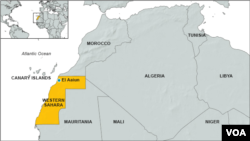Ethnic Sahrawis from the Western Sahara conflict who are living in refugee camps in the Algerian desert seem to be generally able to leave the camps if they wish, although there are cases of abuse, Human Rights Watch said Saturday. HRW says the United Nations must do more to monitor human rights at the camp.
Human Rights Watch researchers say during their two-week visit to the camps, they did find evidence of some abuse, but that there has been an exaggeration by some parties.
“In fact they are able to leave if they so wish to travel, mainly to Mauritania and back to the Western Sahara if they want so it's not true that the Polisario simply prevents them from leaving,” said Eric Goldstein speaking to VOA from Algiers.
Researchers who visited the refugee camps say they were able to move about freely and interview refugees of their choice in private.
In 1975 Morocco annexed the Western Sahara, sparking a war between Moroccan forces and the independence movement, the Polisario Front.
The Algerian-backed Polisario Front says Morocco has consistently violated the human rights of Sahrawis. But Morocco, in turn, accuses Polisario forces of committing abuses at the Sahrawi refugee camps in the Algerian desert, which the Polisario Front has run for the past 40 years.
HRW says the rights group does have some concerns about abuse at the camps.
“We did hear of some cases where people were harassed for having expressed dissent,” said Goldstein.
Goldstein says four years ago the Polisario detained one camp resident for more than two months after he spoke in support of Moroccan rule. The Polisario then sent him across the border to Mauritania and barred him from returning to the refugee camps, where his family lives.
But the campaign group says it has no evidence that the Polisario has imprisoned anyone else for their political beliefs during the past three years.
More monitoring needed
Nonetheless, Goldstein says, human rights in the camps need to be regularly observed.
The United Nations operates a peacekeeping mission in Western Sahara but, unlike most similar missions, it has no mandate to conduct regular human rights monitoring, either in the Western Sahara or in the camps.
Sirine Rached from the rights group Amnesty International says it’s key for the UN mandate to be extended, and not only for the welfare of the Sahwaris.
“But also to de-escalate tension around the conflict, given that frequent allegations of human rights violations by both sides are part of the tension that is happening in the region,” said Rached.
UN mandate
The Polisario says it would welcome enlarging the mandate of the U.N. peacekeeping force in the region, the Mission for the Referendum in Western Sahara, or MINURSO. But Morocco has opposed it, saying it would be an infringement of the sovereignty it claims over Western Sahara.
Without that mandate, Rached says, it’s impossible to know what is really happening on the ground.
“So in the context where allegations are being frequently exchanged, an independent voice that is able to assert the facts of the human rights situation on the ground, which has a sustained presence unlikely us, Amnesty International or Human Rights Watch who are only able to go from time to time for limited periods, would really be beneficial in the long run,” said Rached.
According to the U.N., there are up to 125,000 refugees living in the camps. The refugees endure harsh desert conditions, depend heavily on international humanitarian aid, and have limited job opportunities.
The U.N. classifies Western Sahara as a “non-self-governing territory” and does not recognize Morocco’s annexation.




